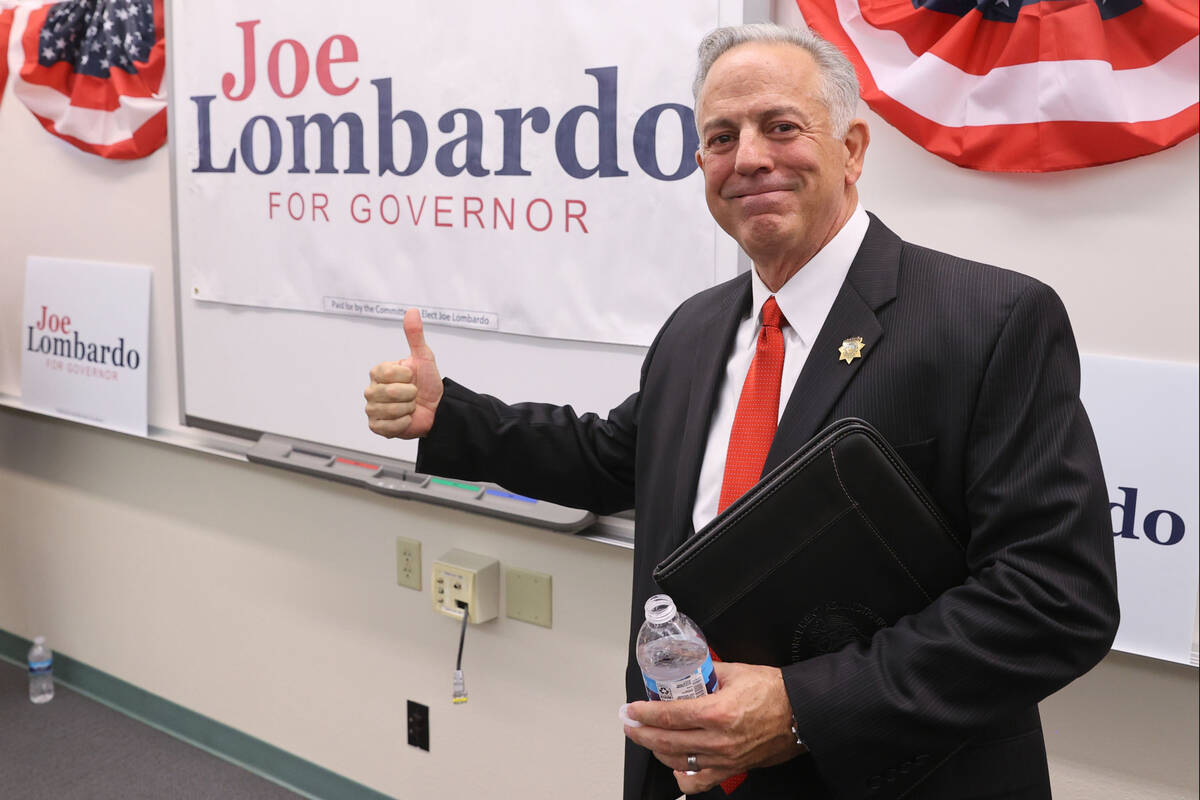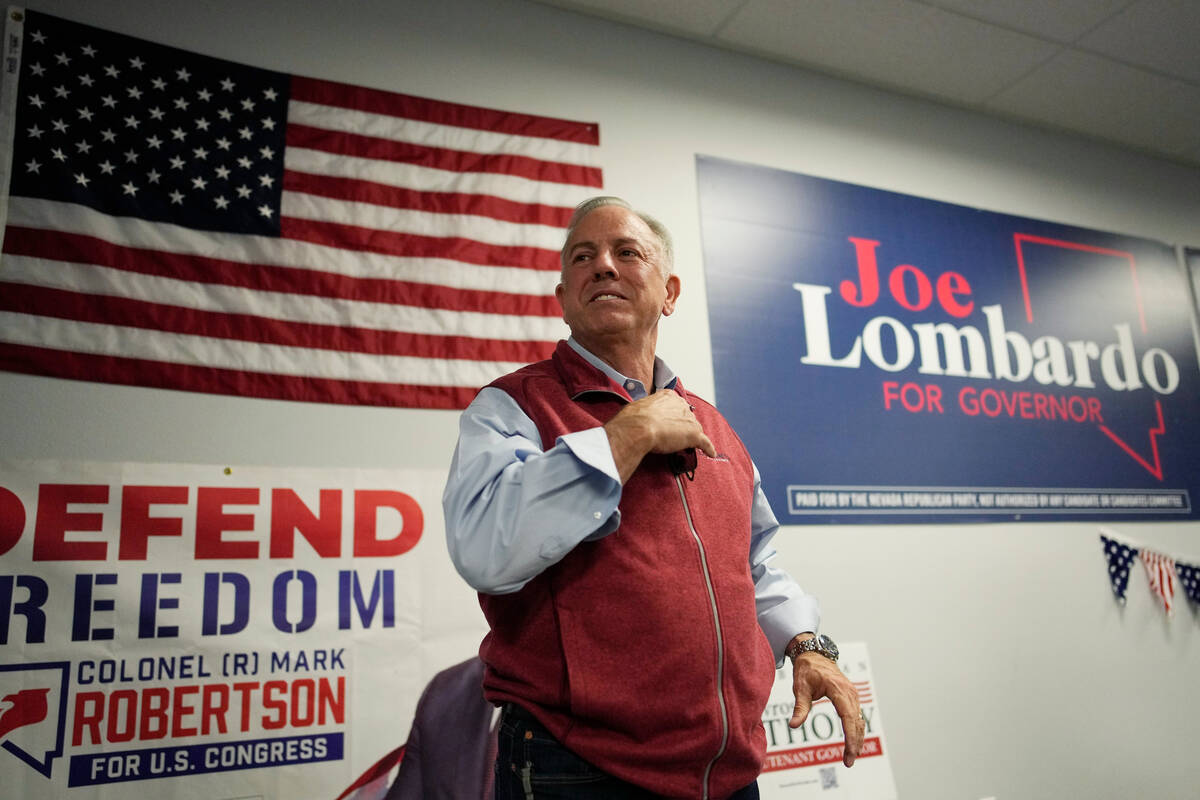Lombardo violated ethics laws, state commission executive director says
CARSON CITY — The Nevada Commission on Ethics’ executive director alleges Gov. Joe Lombardo committed multiple ethics violations by using his sheriff’s badge and uniform during his governor’s campaign, according to materials the commission released Tuesday.
In a motion before the commission that was included in a 456-page packet of materials, the Executive Director Ross Armstrong asked the commission to order Lombardo to pay a civil penalty of about $1.67 million, that a censure be issued and an ethics officer be designated to his office.
Lombardo’s administration and his campaign lawyers did not comment on the filing, but his campaign lawyers in legal papers said Armstrong’s efforts are like “using a sledgehammer to swat a fly.”
A former commissioner resigned from his post in May because of the complaint against Lombardo, saying the commission was tainted by “political interference.”
The Nevada Commission on Ethics will hold a public meeting about the ethics complaint case on Tuesday, June 13 to consider motions in the case.
Using his badge during the campaign
The ethics commission’s executive director argued Lombardo used governmental time, property or equipment to benefit his personal or pecuniary interests.
During his campaign for governor, Lombardo published photos and advertisements of himself wearing his sheriff’s uniform and badge. When he first made his announcement that he was running for governor on Fox, for example, he wore a Metropolitan Police Department’s sheriff badge pin on his lapel, making the “visual imagery of his position as Sheriff his central campaign theme,” according to filings dated March 22.
Nevada state law says “a public officer or employee shall not use the public officer’s or employee’s position in government to secure or grant unwarranted privileges, preferences, exemptions or advantages for the public officer…”
“The Ethics Law and the Commission’s precedent have been clear for many years that the use of a uniform and other accoutrements of office — including a badge — to support one’s campaign constitute violations,” the commission’s Associate Counsel Elizabeth Bassett wrote.
Armstrong also argues that Lombardo’s violations were “willful,” in part because he did not self-report or attempt to rectify the violations before or after the complaints were filed.
It also cited a 2021 Nevada Independent article in which Lombardo’s campaign strategist said that voters were entitled to know about Lombardo’s law-enforcement background, and that it was vital for voters to know a candidate’s work experience.
The commission determined that Lombardo gained financially as a result of the violation, because was elected governor and now receives the governor’s salary and benefits.
Lombardo took a $30,000 pay cut in salary when he became governor, according to his financial disclosure reports. His governor’s salary is $163,474, according to his 2023 financial disclosure report, while his salary as sheriff was $192,000, according to his 2022 annual financial disclosure statement.
‘Inconsequential’ violation
In a motion filed to dismiss the complaint, Lombardo’s attorneys argued that the alleged violations are “relatively inconsequential,” as they are based on a handful of photographs that depict him in his uniform. They argue that no state law prohibits a sheriff’s use of his uniform and badge in campaign materials.
His lawyers also wrote that the executive director threatened impeachment, which they said is “absurd.”
Armstrong, however, wrote that if the commission finds a “single willful violation” against Lombardo, he is required within the ethics law to provide that information to speaker of the Assembly and the majority leader of the Senate.
“What the Legislature does with the information once received is then wholly within the Legislature’s constitutional powers, which may include a variety of sanctions, up to and including impeachment,” he wrote.
Lombardo’s attorneys said that the commission cannot take the alleged violations that Lombardo made in his capacity as sheriff of Clark County and use them to seek impeachment because the conduct occurred before he was sworn in as governor.
‘Tainted by political interference’
Lombardo’s attorneys are not the only ones saying the executive director has overstepped.
Damian Sheets, a former commissioner who was appointed by former Gov. Steve Sisolak, resigned May 17 because of the case made against Lombardo, according to his resignation letter that was obtained by the Review-Journal.
“It is with great sadness that I make this decision, but I can no longer serve on a commission that has strayed from its original purpose and has been tainted by political interference, whether it be a product of internal members’ political views or external influence,” Sheets wrote in the letter.
Sheets felt the commission acted with “bias, prejudice or preference” for “self-initiating” a complaint against Lombardo, he wrote. He accused the commission of not investigating “stronger” complaints against other people.
The claim that a gubernatorial candidate should be prohibited from showing his law enforcement service to the public was “preposterous,” Sheets wrote.
“It is clear to me that the Commission has lost its way and is no longer operating in the best interests of the citizens of Nevada or free of political influence and, while I had hoped to remain on the Commission to vote against any action proposed against Governor Lombardo, it appears that my vote will have no consequences, as the decision has already been made.”
Ethics Commission Resignation by Jessica Hill on Scribd
In an interview with the Review-Journal on Wednesday, Armstrong said that over the course of the 2022 election season, the commission investigated a dozen campaign cases members of all political parties.
‘Unprecedented’ fine
Mark Hutchison, the former chair of the Ethics Commission who served on the commission from 2004 to 2010, called the $1.67 million fine “unprecedented.” The largest fine the commission issued when he was a part of it was $15,000.
In 2004, the commission found that then-Controller Kathy Augustine, committed three “willful violations” when she had her assistant do election-related work on state time, such as coordinating campaign fundraisers and designing campaign invitations. The commission also found that Augustine had stored campaign-related documents on computer equipment owned by the state, according to the commission’s final stipulation.
Hutchison, who also chaired Lombardo’s campaign for governor, says he thinks there are First Amendment concerns about limiting somebody’s ability to educate the public about their own experiences and qualifications when running for office.
“What I fear is that the commission is going to undermine its integrity and the foundational principles that it’s supposed to operate on, which is impartiality and fairness,” Hutchison said.
What’s next?
The June hearing will determine whether there was a violation, and if so, whether it was willful. If the commission finds a violation, it will assign a penalty.
If the commission finds a non-willful violation, penalties could include training, an apology, an admonishment, a payback of a financial benefit, or conditions on future behavior. If commissioners find a willful violation, there could be civil penalties or a petition for removal.
Ethics Commission Report by Jessica Hill on Scribd
Contact Jessica Hill at jehill@reviewjournal.com. Follow @jess_hillyeah on Twitter.
An earlier version of this story misstated which entity has accused Lombardo of violating ethics laws.























